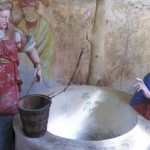 Acts 17:16-34
Acts 17:16-34
TO THE UNKNOWN GOD.
That was where Paul chose to begin his discourse with the Athenians. TO THE UNKNOWN GOD.
Now why in the world did Paul begin here? It raises two important issues for the day. First, we are to be in the world but not of it. Second, when bringing Christ to others, begin where they are.
First, Paul was a man who was clearly in the world but also clearly not of it. Only someone like Paul would have been equipped to take on the Athenians and have a deep impact on their lives. What was it about Paul that equipped Paul to teach the Athenians? I’m glad I asked.
Paul, of course, was from Tarsus, which was a university city known for its Stoic philosophers and culture. The schools of Tarsus rivaled Athens and Alexandria. Strabo, the Greek geographer, praised Tarsus for its education, philosophy, poets and linguists. Paul didn’t stay in Tarsus but had an even broader education, perhaps partially because the custom of the university of Tarsus was for students to study abroad, and partially because as a Jew Paul probably studied in cosmopolitan Jerusalem.
His Jewish education was that of a Pharisee, and he studied under Gamaliel, who was one of the greatest rabbis of his day and was also the grandson of the famous Hillel. This Jewish education allowed Paul to speak to the Jews in the synagogue, while His Greek education allowed him to speak to Greeks in the marketplace.
Paul also had the advantage of being a natural-born Roman citizen, a high and useful privilege.
With these impeccable credentials, Paul was able to take the city of Athens and its idolatry head on. In his speech to the Athenians (facilitated by his rhetorical skills learned both at the university in Tarsus and in the synagogues with the rabbis), Paul made skillful use of Greek literature and philosophy. He could not have done this if he did not know the world to which he was going. Had he been schooled only in the Old Testament, he would probably not have had much success with the Athenians.
But in Acts 17, in what is sometimes called the Mars Hill (Areopagus) Speech, Paul quotes freely from Greek writers and philosophers. “For in him we live and move and have our being” is not an original phrase of Paul’s, and it’s not a quotation from the Old Testament Scriptures: it’s from the poet Epimenides. When Paul says, “As even some of your own poets have said, ‘For we also are His offspring’” he’s quoting Aratus and Cleanthes. His “Do not be deceived: ‘Bad company corrupts good morals’” is from Menander (1 Corinthians 15:33), and his “Cretans are always liars, evil beasts, lazy gluttons” is from Epimenides (Titus 1:12).
Paul literally spoke their language, Greek, but also knew and spoke fluently the language of their culture. Knowing the culture that well, however, has hidden dangers. It’s entirely possible that we know the culture too well, in that we become like it. While I believe it’s wise for Christians to know more about American and contemporary culture, I fear in many ways that we know too much about it. Much of what passes for Christianity in America is only American culture, and much of the overt worldliness of our culture has crept into the modern church.
Christians are therefore placed between the Scylla of being a sect that is so separate from the world that it is effectively a ghetto that cannot speak to the world and the Charybdis of being so much in the world that we become like it.
If we as Christians want to make an impact on our culture, then we must understand it and participate in it. We must seek to capture the Athens of the world, our cultural centers. Athens was the city from whence came Greek poetry and plays, their most important philosophers, and the political philosophy of the West. We have our Athens here in the U.S., too: education, universities, government, the media, and now the Internet. We need to bring the gospel of Jesus Christ to these cultural centers. And to do that, we need to understand our culture from a Christian worldview and from God’s perspective that offers a heavenly vantage point.
American culture and Western culture have many things to appreciate about them, and we should be thankful for these. But American culture is not the same as the Church or the Kingdom of God. God is incarnated in our experiences, in our cultures. We should therefore love the culture and people among whom God has placed us. We should know and love them well, but without becoming them. For we also have a heavenly culture, a heavenly city, and a heavenly kingdom – and we must never forget it.
Second, we must begin where people are, whether they are hearing about Jesus Christ for the first time, or whether we are discipling and encouraging those already claiming to be His disciples. Paul’s background suited him to bring Christ effectively to both Jews and Greek. Notice that in one verse, verse 17, Paul both reasons in the synagogue with the Jews and with the Gentiles in the marketplace. To the Jews, it was his custom to worship with them and argue from the Old Testament Scriptures and the Law that Jesus was the Christ. To the Athenians, he comes quoting from Greek poets and philosophers and uses Greek reasoning and the Greek language.
Paul holds to his own principle that we should be all things to all people. You and I may not have the wealth of gifts and training that Paul had, but his principle remains the same. Start where people are at. Sometimes He may call you to go out of your comfort zone and be Christ’s presence to those who are very different from you. But often, he calls you to bring Christ and be Christ to those you already have something in common with: your neighbors (and not just geographical ones). If you’re a nerdy intellectual type, then God has probably called you to bring Jesus Christ to nerdy, intellectual types.
Several years ago, one of my freshmen students was a cutter, someone who cut herself on her wrists so that she could feel alive and make the emotional and spiritual pain go away and have one area of her life where she felt she was in control. Of course, I didn’t know she was a cutter to begin with. I began to get to know her because I discovered she had an interest in poetry and had written some. I asked to see her poetry, and honest poetry is a window to the soul. That Aha! moment of sharing poetry opened up many deep discussions with her for an entire school year.
When I and one of my priest friends stumbled into the Poet’s Loft in Hot Springs, Arkansas one night to read poetry, a world of pagans opened up to us because we like poetry and spirituality and philosophy and weren’t freaked out by the freaks of our culture. Music is a door to relationships with teens: is it one you dare to open?
My spirit is provoked within me, because I see that my culture is given over to idols, and I see that these idols are creeping into my beloved Church. Therefore, I choose to study and learn about my culture, not that I might follow it in all things but that I might bring Jesus Christ into it. And He’s the only one who can transform it, one soul, one body, at a time.
Prayer: O Lord, who sent Your Son into the world to become a man and redeem all humanity, I ask that You encourage me to use the gifts and experiences You have given me, sanctified by the presence and work of Your Holy Spirit, to be Your presence in the lives of those You have placed in my life. Inspire me with a knowledge and love of those around me and of my culture, and defend me from the temptations of the same, that in all things You might be glorified; through Jesus Christ our Lord. Amen.
Points for Meditation:
1. What aspects of our culture do you particularly enjoy and understand? How might this be used to bring Christ into this culture?
2. What temptations from the culture do you face? How can you be less of the world while remaining in it?
Resolution: I resolve to look today for one opportunity to use my knowledge and love of my culture and the people in my life to bring the presence of Jesus Christ to them.
© 2012 Fr. Charles Erlandson











